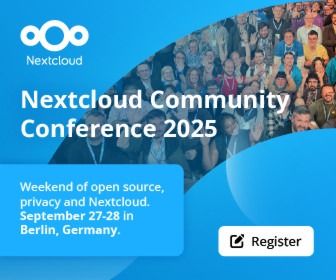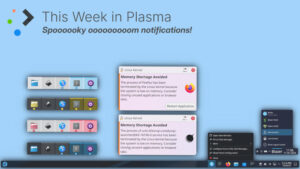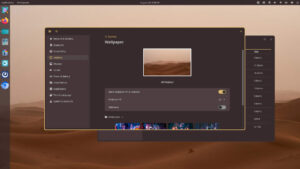This week FOSS News Roundup also includes a list of some goodies coming to KDE Plasma 6.

This has been an exciting week in the FOSS world, especially with All Things Open getting ready to pitch its tent for this year’s “greatest open-source show on Earth!”
The show opens either tomorrow or on Monday, depending on how you look at it. Tomorrow the ATO dudes and dudettes will be at the Raliegh Convention Center for early registration and to put on their two free pre-events, an Inclusion and Diversity “non-conference” and a Community Leadership Summit. Both are good events that are highly worthwhile (and free). The real deal show however, All Things Open — the one you have to shell our a little bit of money for — runs Monday and Tuesday.
I won’t be able to go this year, which has me all sorts of bummed out, especially since as far as I can tell this year’s show isn’t going to be livestreamed. Oh well, maybe next year.
Anyway, enough about me. Let’s get on to this week’s FOSS News Roundup:
Can Gaza’s Tech Industry Survive War?
Probably not, if the talking heads are right about Israel’s intentions.
While Gaza is pretty much known for being an overpopulated and poverty soaked region whose entire population pretty much doesn’t have citizenship with any recognized country, it’s also something of a tech hub — and not just for the locals, but for the benefit of the international tech community as well, according to Mike Butcher writing for TechCrunch.
“International companies have, for many years, sought out a presence there to collaborate both with with talented tech freelancers, and the startups which gradually emerged from the region,’ he wrote, and pointed to Nvidia, which is said to be working with more than a 100 Gaza-based engineers.
Right now, he said, along with the rest of Gaza, the fragile tech businesses are under fire, and points to an Alphabet-backed coding academy in the region.
“Gaza Sky Geeks is the largest tech-hub in Palestine, providing a wide range of tech training at scale,” he said. “In 2022, 5,000 coders and developers from across the West Bank and Gaza graduated from the program.”
During the last week, that organization’s building was reduced to rubble. You can read the entire story here.
Microsoft Wants You to Know How to Install Linux
Once upon a time, Microsoft hated Linux and open-source so much that every time then CEO Steve Ballmer talked about the subject his face would turn beet red, spittle would start drooling down his chin, and he would heat up so much that he’d break out into a sweat. Those days are gone, mainly because the company now make billions renting Linux by the minute on its cloud (and because Steve Ballmer is no longer there).
In fact, this “new” Microsoft now claims to like Linux, and likes it so much that it’s put together a howto for installing it, which it’s published on its website.
Near the top of their instructions is a section on choosing an installation method, which the Microsofties narrow down to four: “Windows Subsystem for Linux (WSL), Bare metal Linux; or create a Virtual Machine (VM) to run Linux locally or in the cloud.”
To paraphrase Proctor and Gamble Bergman from an old comedy album called TV or Not TV that nobody remembers: What was once four is now two — with no slight of hand necessary. As Liam Proven at The Register pointed out, Microsoft’s four choices basically turn out to be a choice between running Linux as a VM or on metal.
After that, the instructions are quite good (even Proven thinks so). Good enough that I was tempted to save the URL to my bookmarks, to give to any Linux newbie who wants to know the ins and outs of adopting Linux. Trouble is, I can’t do that because I’m still not ready to quit disliking Microsoft. My solution is to write about it here with an easy to find link to the Microsoft article, so I can direct people here and tell them to find the link.
Right to Repair Is Now the Law in California
Your right to repair stuff you buy is now the law in California, since Governor Newsom this week signed a bill into law that makes it so. Under the new law, manufacturers are required to make documentation, tools, and other repair essentials available to consumers and independent repair shops at affordable terms. The law isn’t perfect by any measure because lobbyists, as they have been able to do elsewhere, were able to carve out exemptions for game consoles, alarm systems, and agricultural and forestry equipment. I guess that means John Deere is still off the hook.
Despite the negatives, this is still positive news. It means that more than 20% of us folks in the USA are now covered under some sort of right to repair legislation, no matter how imperfect.
Karl Bode at Techdirt reminds us that it wasn’t a given that California’s governor wouldn’t veto the bill after it was passed by the state legislature. In the past, Newsom has vetoed bills aimed at legalizing psychedelics, providing free condoms to high school students, capping insulin prices at $35, and providing severance pay to grocery store workers put out of work by mergers, and more. Strange sort of Democrat, Governor Newsom.
New Stuff Coming to KDE Plasma
The more I read what Nate Graham has to say about the new stuff coming to KDE Plasma 6, the more I’m tempted to ditch Linux Mint Xfce for something that has KDE well integrated into the mix. I’ve often thought of doing that anyway, since KDE was my first love when it comes to Linux desktops and I often find myself missing it, even though it’s been a decade since I used it as my daily driver.
This week Graham mentioned a bunch more new stuff that’ll be included in Plasma 6 when it’s released in February. Here are just a few items that tripped my trigger:
- KWin now includes an effect that can change the colors on the whole screen to better support people with various forms of color-blindness! (I’m not color-blind, but I think that is so cool. When I’m thinking about accessibility, I don’t think I’ve ever thought about the color-blind before.)
- Kate, KWrite, and other KTextEditor-based apps gained support for speaking text from the document! (Also cool. Even back when I used KDE as my daily driver, I never used the DE’s text editors because I liked Bluefish (OK, you’re right, I did use Kate occasionally), but to have my stuff read back to me would definitely be enough to get me to give up Bluefish, which frankly is getting a bit long in the tooth.)
- LibreOffice documents now appear in Plasma’s “Recent Documents” list. (I really like this one too, but not as much for me as for others, because I prefer to write in text editors unless I need the formatting capabilities of a word processor.)
Now those are just the ones that piqued my interest this week. There are more, that you can see here. And don’t forget, Graham writes his This Week in KDE thing every week, so keep checking back in.
Well, that does it until next weekend. Until then, may the FOSS be with you…
Oh, and just in case you were wondering about that Proctor and Bergman reference:
Christine Hall has been a journalist since 1971. In 2001, she began writing a weekly consumer computer column and started covering Linux and FOSS in 2002 after making the switch to GNU/Linux. Follow her on Twitter: @BrideOfLinux












Your article about “Can Gaza’s Tech Industry Survive War?” tells only half the story of the article it’s based on, at https://techcrunch.com/2023/10/14/palestine-tech-industry-hamas-israel-war/ , an article that also says “The tech industry in Israel — the country’s biggest export, and its biggest single contributor to GDP — is also taking a big knock” and “Israel is currently retaliating militarily against the attacks on its people, on its soil, and the hostages subsequently taken by Hamas — the ruling organisation in Gaza that kidnapped at least 150 people and took them into Gaza during brutal attacks on Israel last weekend that killed 1,300 people.”
I know that Fossforce is apolitical, so I sincerely hope that the absense, in your article, of the balancing information was an oversight rather than an agenda.
Hi Steve,
The piece was part of my weekly news roundup, and since I didn’t have space to go into detail, the purpose of the snippet was to get people to read the linked article, not to try to be through, which I thought was obvious by the way I ended the Gaza section. I did want to focus on the effect on the Gaza economy that’s not connected with Hamas however, as the Israel side of the story is getting plenty of press elsewhere and Gaza’s is not.